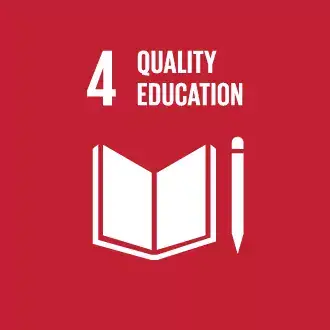
Quality education promises today’s youth a better tomorrow. It prepares them with the necessary skills to create positive change that will advance sustainable development for years to come. Yet for more than a billion people, this fundamental human right remains out of reach.
Even before the COVID-19 pandemic wreaked havoc on global education and exacerbated inequalities between rich and poor countries and households, more than 750 million adults remained illiterate and more than 250 million children were out of school. More than half of those in school were not meeting minimum proficiency standards in reading and maths.
COVID safety concerns have forced schools to close for 90 per cent of the world’s students. At least 500 million educationally displaced youth still lack remote learning capabilities due to the digital divide and other structural disadvantages. The UN estimates that more than 200 million children will still be out of school by 2030.
This mass exclusion has a profound negative impact on learning outcomes and the social and behavioural development of children and young people, especially those living in remote areas, extreme poverty, fragile states, refugee camps, and other vulnerable communities. The adverse effects of inadequate education last a lifetime and often spill over into future generations, severely limiting human potential.
Goal 4 aims to ensure inclusive and equitable quality education and promote lifelong learning opportunities for all. To succeed, UN bodies and partners are working with local communities to ensure that all children have access to early childhood development, care, and pre-primary education and that they go on to complete free primary and secondary school. Thereafter all learners should have equal access to affordable and quality technical, vocational, and tertiary educational opportunities where they can develop relevant skills for decent employment. Along the way they should acquire the knowledge and skills needed to promote sustainable development. Achieving these targets will require better schools with better facilities, more scholarships, and more qualified teachers. This should result in improved literacy, numeracy, and parity among learners.
UNICEF estimates that faith communities operate half of the world’s schools, most crucially in hard to reach places where governments are unable to provide for poor and vulnerable youth. This steadfast commitment demonstrates the critical role faith-based organizations and religious institutions play in advancing children’s rights and enhancing their well-being through education.
One prominent faith-based group leading this effort is Arigatou International. Arigatou uses interreligious dialogue and cooperative action to safeguard children’s rights. In 2000 they launched the Global Network of Religions for Children (GNRC), an interfaith coalition of organizations and individuals that represents the world's major religions and spiritual traditions. GNRC leads more than 200 projects in 70 countries, all of them aimed at giving children a chance to shine. In partnership with GNRC members, Arigatou worked with UNESCO and UNICEF to develop Learning to Live Together. This ethics education programme helps children understand and respect people from diverse religious and cultural backgrounds and promotes core ethical values including empathy, responsibility, and reconciliation.
Alongside interreligious organizations implementing Goal 4 are numerous faith-specific groups, many of which promote quality education as a means to advance other related goals.
Buddhist Global Relief strives to relieve chronic hunger and malnutrition worldwide. In many areas where they serve, inadequate access to education exacerbates hunger and perpetuates the cycle of poverty, especially for girls and young women. Buddhist Global Relief provides schooling, scholarships, housing, nutritious meals, uniforms, desks, and other school supplies to children in India, Vietnam, Thailand, Uganda, Cameroon, Nicaragua, and Peru. Their work near Lima supports the daughters of domestic workers with material and psychosocial support to keep them in school and out of child labour. Their work on the Thailand-Myanmar border supports the children of medics who risk their lives delivering healthcare to persecuted ethnic minorities.
Muslim Global Relief works to lift rural communities out of poverty and help them build stable and secure livelihoods in remote villages across Africa, Asia, and the Middle East. Their Education for Everyone Programme builds schools, trains teachers, and provides textbooks to improve the lives of hundreds of thousands of children in these regions. Muslim Global Relief also works to bring struggling schools up to international standards. In Gaza they provide Palestinian children with educational materials and install water storage solutions to keep schools and orphanages open and safe.
The Lutheran World Federation is a global communion of churches representing 77 million Christians in 99 countries. The Federation collaborates with interfaith actors and religious leaders to support local communities and authorities in improving school infrastructure and teaching capacities. They also support vocational training schemes for young people and other vulnerable groups, all with an eye to promoting social cohesion and peaceful co-existence.
KAICIID works to achieve similar objectives, offering educational courses and activities that teach people about interreligious dialogue as a means to transform conflict into peace and reconciliation. The Centre’s Dialogue Knowledge Hub and Peacemap offer online research tools that allow stakeholders to share best practices for using dialogue to advance educational and other sustainable development goals.
These and countless other examples demonstrate the important role faith-based organizations and religious institutions play in implementing Goal 4. As forebearers of the modern school movement and some of the earliest institutions to offer basic schooling for girls, faith-based education providers continue to light the way towards inclusive and equitable quality education and lifelong learning opportunities for all.
